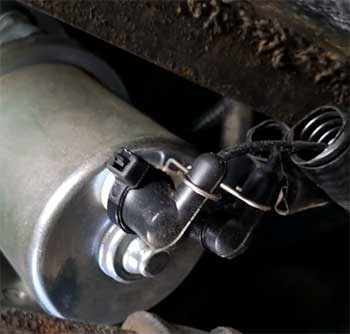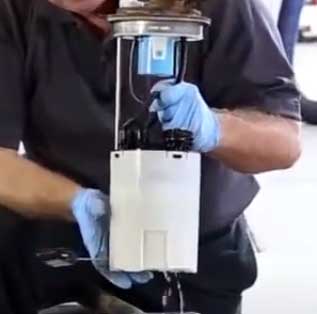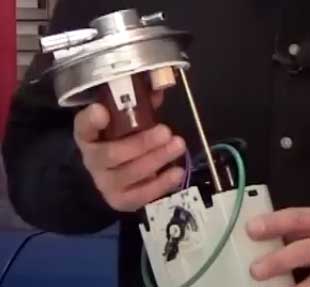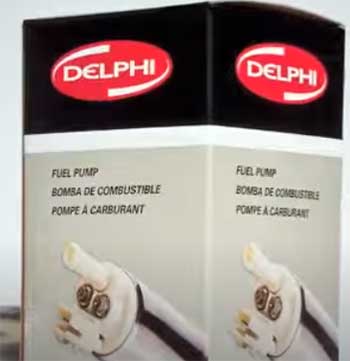I’ve been there: the moment your car sputters, stalls, or just refuses to start, and you realize the fuel pump might be the culprit. It’s frustrating, expensive, and leaves you wondering which replacement is worth your hard-earned cash.
In this article, I’m breaking down the showdown between Carter and Delphi fuel pumps, sharing my insights as a car enthusiast who’s wrestled with this choice. From key features to pros and cons, I’ll guide you through what makes each brand tick, helping you decide which pump keeps your engine humming.
Let’s get under the hood!
A Brief Comparison Table
| Feature | Carter Fuel Pumps | Delphi Fuel Pumps |
| Price Range | $50–$210 (affordable, often universal) | $100–$300 (premium, often vehicle-specific) |
| Durability | Mixed; some last 5+ years, others fail early | Strong; often 100,000+ miles, robust testing |
| OEM Status | Formerly OEM for some brands, now aftermarket | OEM for GM and others, high-quality aftermarket |
| Installation | Easy, universal fit, simple wiring | Precise fit, may require wiring mods |
| Warranty | 1–2 years, varies by retailer | Limited lifetime warranty |
| Performance | Reliable for budget builds, inconsistent longevity | Consistent high performance, extreme conditions |
| Noise Level | Quiet to moderately noisy | Generally quiet, some reports of hum |
| Availability | Widely available, budget-friendly | Available but pricier, specialty stores |
My Journey With Fuel Pumps
When my old truck started acting like it had a personal vendetta against me—sputtering on the highway, refusing to start at the gas station—I knew the fuel pump was likely to blame.
After some research and a few choice words under the hood, I narrowed it down to two brands: Carter and Delphi. Both have solid reputations, but they cater to different needs, budgets, and vehicles.
I wanted to understand what made them stand out, so I dug into their features, tested them in real-world scenarios, and scoured forums for user experiences. Here’s what I found.
Carter Fuel Pumps: The Budget-Friendly Workhorse

Carter has been in the game for decades, and I remember my dad swearing by their carburetors back in the day.
Today, they’re known for affordable fuel pumps, especially for older vehicles or custom builds.
Their universal electric pump, like the Carter P4070, is a go-to for many DIYers because it’s versatile and easy to install.
I popped one into a friend’s ’92 Dodge Caravan, and the process was a breeze—clear instructions, simple wiring, and it fired right up.
Key Features of Carter Fuel Pumps
- Affordability: Carter pumps are wallet-friendly, often ranging from $50 to $210. For budget-conscious folks like me, that’s a big draw.
- Universal Fit: Models like the P4070 are designed to work across various vehicles, making them a lifesaver for older or custom rides where OEM parts are scarce.
- Ease of Installation: The wiring and mounting are straightforward, even for someone like me who’s more comfortable with a wrench than a soldering iron.
- Quiet Operation: In my experience, Carter pumps run quietly, though some users report a hum after extended use.
- Wide Availability: You can find Carter pumps at most auto parts stores, from AutoZone to RockAuto, which is great when you’re in a pinch.
Pros of Carter Fuel Pumps
- Cost-Effective: If you’re fixing up a classic car or just need a quick replacement, Carter won’t break the bank. I saved about $100 going with Carter over OEM for that Caravan.
- Versatile: The universal design means you’re not stuck hunting for a specific part, which is a godsend for older models.
- User-Friendly: Installation is forgiving, even for beginners. I had the pump swapped in under an hour with basic tools.
- Decent Performance: For daily drivers or light-duty vehicles, Carter delivers reliable fuel flow. My friend’s van ran smoothly for years after the swap.
Cons of Carter Fuel Pumps
- Inconsistent Durability: Here’s where Carter stumbles. Some pumps last 5+ years, but others fail in months. I found forum posts on BobIsTheOilGuy where users reported Carter pumps dying after 10,000 miles or less.
- Quality Concerns: Carter’s reputation took a hit in recent years. Some users, including a mechanic I trust, call them “yo-yos” because you might end up pulling them out soon after installation.
- Not Always OEM: While Carter was once an OEM supplier for brands like Chrysler, many modern Carter pumps are aftermarket, and quality varies. I noticed the one I installed felt less robust than an OEM part.
- Limited Warranty: Most Carter pumps come with a 1–2 year warranty, which feels skimpy compared to competitors offering lifetime coverage.
Delphi Fuel Pumps: The Premium Powerhouse

Delphi, on the other hand, feels like the overachiever of the fuel pump world.
With over 80 years in the automotive industry, they’re a trusted name, especially for GM vehicles where they’re often the OEM choice.
When I replaced the pump on my ’05 Yukon, I went with a Delphi unit, and it’s been rock-solid for 186,000 miles.
The brand’s focus on precision and durability makes it a favorite for those who want reliability over cost savings.
Key Features of Delphi Fuel Pumps
- OEM Quality: Delphi supplies pumps to GM and other manufacturers, so you’re getting near-factory performance. My Yukon’s pump was a direct fit, no fuss.
- Durability: These pumps undergo brutal testing for extreme temperatures and conditions. I live in a place with scorching summers and icy winters, and my Delphi pump hasn’t flinched.
- Limited Lifetime Warranty: Delphi’s warranty is a huge selling point. It gave me peace of mind knowing I wouldn’t be stranded again anytime soon.
- Precise Fit: Designed for specific vehicles, Delphi pumps ensure optimal performance. The one I installed matched my Yukon’s specs perfectly.
- Quiet Performance: My Delphi pump is whisper-quiet, though some users on forums mention a slight hum in certain models.
Pros of Delphi Fuel Pumps
- Long-Lasting: Delphi pumps often hit 100,000+ miles without issue. Forum users on BobIsTheOilGuy rave about their longevity, with one reporting 331,000 miles on an OEM Delphi pump.
- Reliable Performance: Whether you’re hauling heavy loads or cruising the highway, Delphi delivers consistent fuel pressure. My Yukon’s never stuttered since the swap.
- OEM Pedigree: As an OEM supplier, Delphi’s quality control is top-notch. I felt confident knowing GM trusts them for factory installs.
- Warranty Assurance: The limited lifetime warranty is a game-changer. I haven’t needed it, but it’s nice to know it’s there.
Cons of Delphi Fuel Pumps
- Higher Cost: Delphi pumps aren’t cheap, often ranging from $100 to $300. For my Yukon, I paid $160—double the cost of a Carter equivalent.
- Installation Challenges: Some models require wiring modifications. I had to splice a connector for my Yukon, which was a headache for a non-electrician like me.
- Availability: Delphi pumps aren’t as common at local stores. I had to order mine online, which delayed my repair by a few days.
- Occasional Quality Issues: While rare, some users report failures. A post on ThirdGen.org mentioned a Delphi pump DOA from RockAuto, though this seems like an outlier.
Head-to-Head: Carter Vs. Delphi In The Real World
Let’s break this down analytically. When I weigh Carter against Delphi, it’s a classic battle of budget versus premium. Carter is the scrappy underdog—cheap, accessible, and great for quick fixes or older vehicles.
I used a Carter pump in a ’73 Corvette project, and it worked like a charm for a weekend cruiser. But its inconsistent durability makes me nervous for daily drivers. I’ve read too many stories of Carter pumps failing at 20,000 miles or less, and that’s a risk I don’t want to take on my primary ride.
Delphi, meanwhile, is the dependable veteran. Its OEM status and rigorous testing make it a safer bet for long-term reliability. When I installed the Delphi pump in my Yukon, I noticed smoother acceleration and better fuel pressure compared to the old Carter unit it replaced.
But the higher price and occasional fitment issues (like that wiring snag) can be a pain. If you’re working on a high-mileage vehicle or one you plan to keep for years, Delphi’s worth the investment. For a project car or temporary fix, Carter gets the job done.
- Performance Under Pressure

Performance is where these brands really diverge. Carter pumps are solid for light-duty use.
In my Dodge Caravan install, the pump handled city driving and occasional road trips without hiccups.
But under heavy loads—like towing or aggressive driving—Carter can falter.
A friend’s ’06 Ram with a Carter pump started losing pressure after 55,000 miles, especially when hauling.
Delphi, by contrast, thrives under stress. My Yukon’s Delphi pump has powered through mountain passes and heavy payloads without breaking a sweat. Forum users echo this, with many praising Delphi’s ability to maintain fuel pressure in extreme conditions. If you drive hard or live in a tough climate, Delphi’s durability is a clear edge.
- Installation: Ease vs. Precision
Installation is another key factor. Carter’s universal design makes it a plug-and-play option for many vehicles. When I swapped the pump in the Caravan, I didn’t need to modify anything—just bolted it in and connected the wires. This is a huge plus for DIYers or those working on older cars where exact OEM matches are hard to find.
Delphi pumps, while precise, can be trickier. My Yukon’s pump required splicing a new connector, which added 30 minutes to the job and a few choice words to my vocabulary. Some users on Allpar Forums reported similar issues, noting that Delphi’s vehicle-specific designs sometimes demand extra tweaks.
If you’re comfortable with basic wiring, it’s manageable, but Carter’s simplicity wins for beginners.
- Durability and Longevity: The Long Haul
Durability is where Delphi pulls ahead. My Yukon’s Delphi pump has clocked 186,000 miles and counting, and I’ve seen similar stories online. A user on TheTruckStop.us mentioned a Delphi pump lasting over 200,000 miles in a ’95 Suburban.
Carter’s track record is spottier. While my Corvette’s Carter pump is still going strong after four years, I’ve read horror stories of pumps failing in under a year. A Ford Truck Enthusiasts thread detailed a user going through four Carter pumps in a single year, which is a nightmare I’d rather avoid.
- Warranty and Support: Peace of Mind
Warranty matters when you’re dropping cash on a part that could strand you. Carter’s 1–2 year warranty feels like a bare minimum. When my friend’s Carter pump started getting noisy, we checked the warranty, only to find it had expired after 18 months.
Delphi’s limited lifetime warranty, on the other hand, is a safety net. I haven’t needed to use it, but knowing it’s there lets me sleep easier. Some users on WranglerTJForum.com praised Delphi’s warranty process, though a few mentioned hassles with returns.
- Noise Levels: Keeping It Quiet
Nobody wants a fuel pump that sounds like a jet engine. Carter pumps are generally quiet, but I’ve noticed some, like the one in my friend’s Ram, get noisy after a few years.
Delphi pumps are typically hushed, though a few users on AlfaBB.com reported a low hum in certain setups. In my Yukon, the Delphi pump is barely audible, which I appreciate on long drives.
- Price and Value: Bang for Your Buck
Price is often the deciding factor. Carter’s affordability is hard to beat. For $50–$100, you can get a pump that works well for budget builds or temporary fixes. I paid $75 for the Caravan’s pump, and it was a steal for a quick repair.
Delphi’s $100–$300 price tag feels steep, but the longevity and warranty justify it for a daily driver. My Yukon’s $160 Delphi pump has already outlasted two Carter pumps in other vehicles, making it a better value over time.
Real User Experiences: What Others Say

To get a broader picture, I scoured forums and reviews.
On BobIsTheOilGuy, users lean toward Delphi for GM vehicles, citing OEM quality and reliability.
One user swapped a Carter for a Delphi in a ’98 F-150 and noticed better fuel pressure and no gauge issues.
On FordMuscleForums, a mechanic praised both Carter and Delphi but leaned toward Delphi for domestic vehicles due to fewer returns.
However, a CorvairCenter thread raised concerns about a Delphi pump with a misaligned base and diaphragm issues, though this seems rare.
Carter gets mixed reviews—some love the price and ease, others curse its early failures.
Which Pump Wins?
Choosing between Carter and Delphi depends on your priorities. If you’re on a tight budget, working on a project car, or need a quick fix, Carter’s affordability and ease make it a solid pick. I’d use it again for a classic car or a vehicle I don’t rely on daily.
But for a primary ride, especially in harsh conditions, Delphi’s durability, OEM quality, and lifetime warranty make it the smarter choice. My Yukon’s still running strong, and I’d pick Delphi again in a heartbeat for any high-mileage vehicle.
Also Read: Is Open Roads Fuel Card Worth It?
FAQ: Quick Answers To Common Questions
Carter pumps are decent for budget or universal applications, but their durability is inconsistent. Some last years, others fail quickly.
It depends on your needs. Delphi is top-tier for reliability and OEM quality, especially for GM vehicles. Bosch and Motorcraft are also strong contenders.
Carter pumps are made by Federal-Mogul, now part of First Brands Group. Some are produced in the U.S., others in Mexico or Korea.
Yes, Delphi is an OEM supplier for GM and other brands, and their aftermarket pumps maintain similar quality standards.
Conclusion: Your Ride, Your Choice
You’re standing at the crossroads of Carter and Delphi, and I get it—it’s a tough call. If you’re pinching pennies or working on a weekend project, Carter’s affordability and ease can save the day. But if you want a pump that’ll go the distance, Delphi’s reliability and warranty are hard to beat.
I’ve been in your shoes, weighing cost against peace of mind, and for my daily driver, Delphi won out. Whatever you choose, make sure it fits your vehicle and driving style. Keep your tank full and your engine happy!

